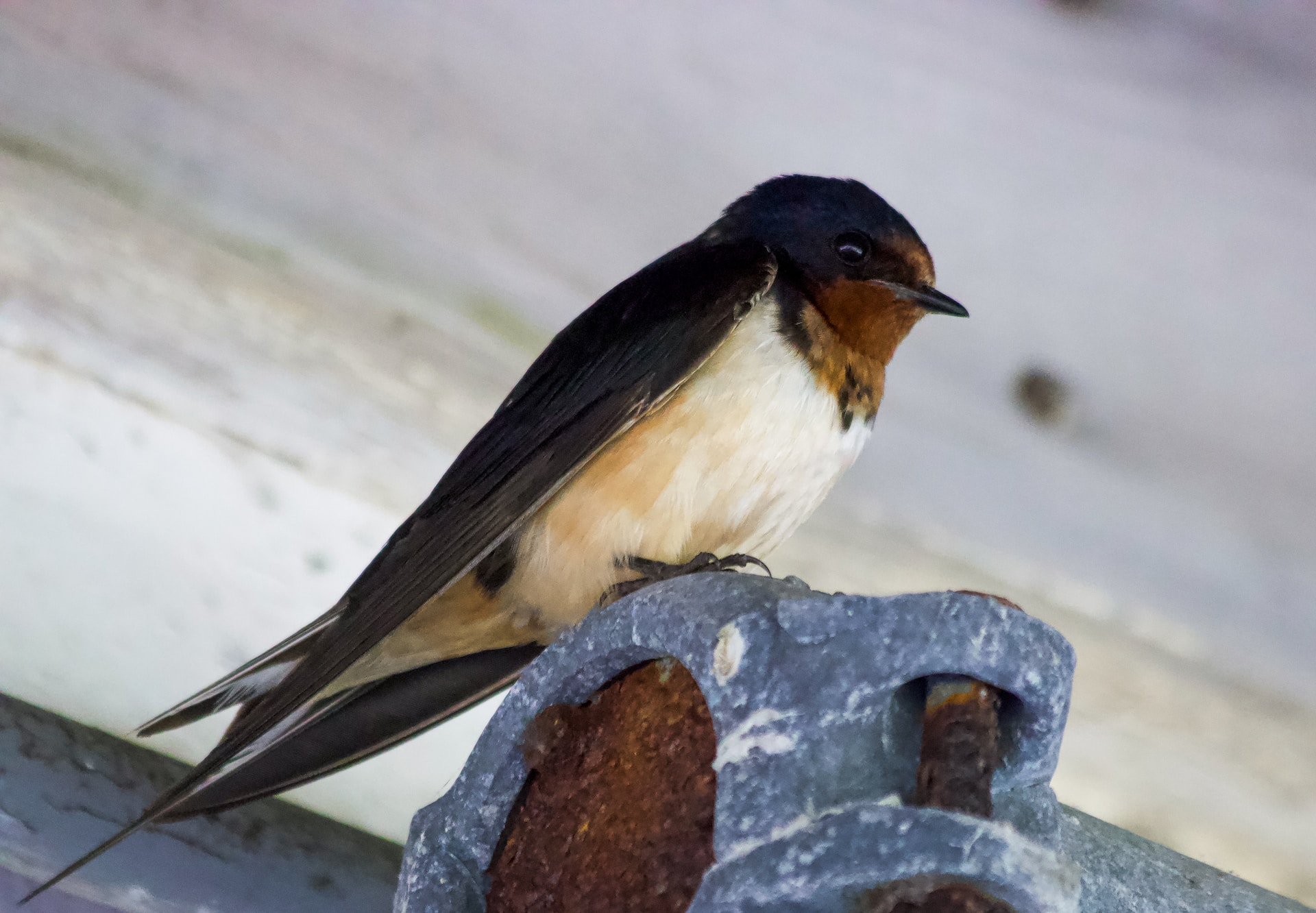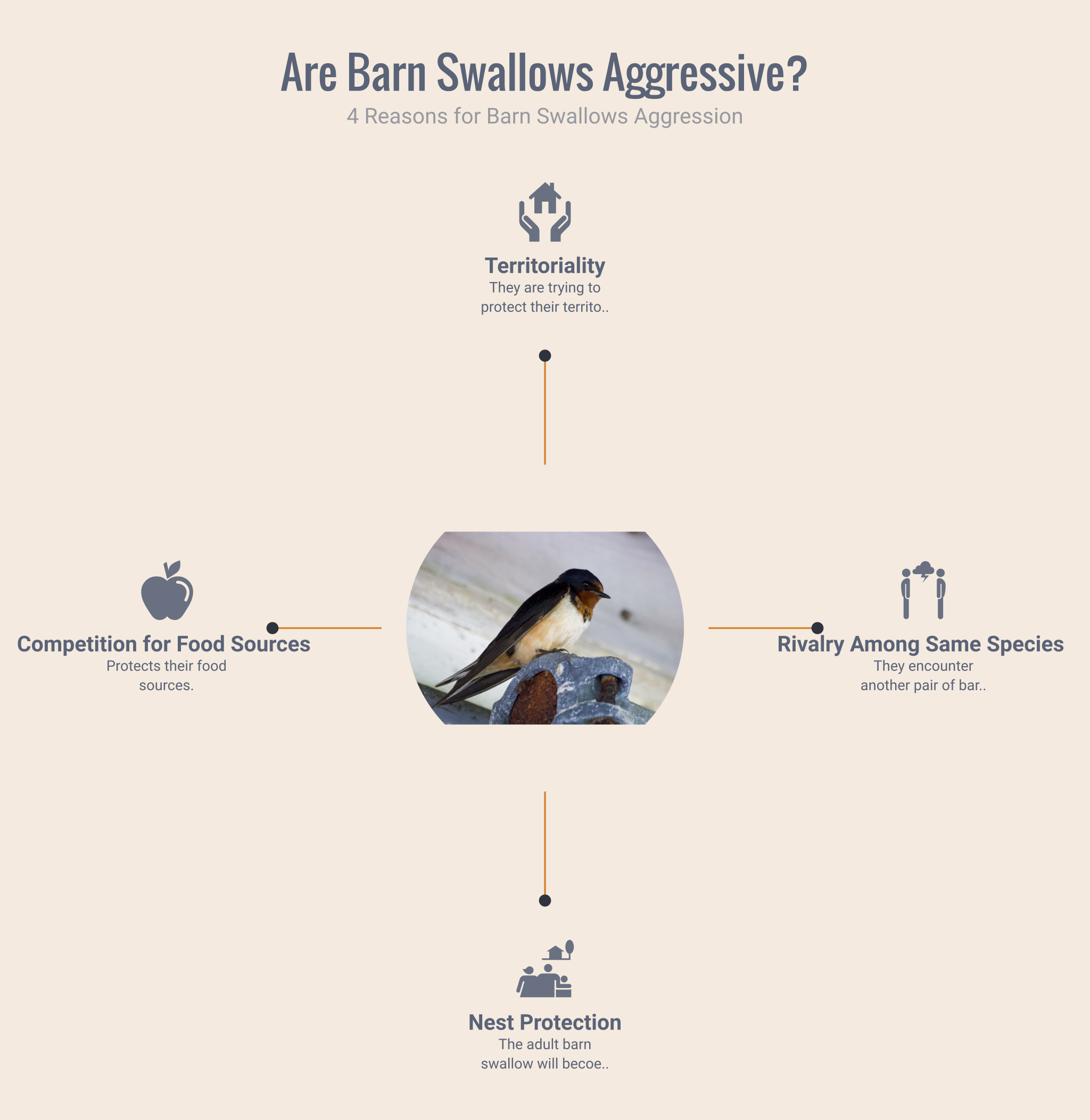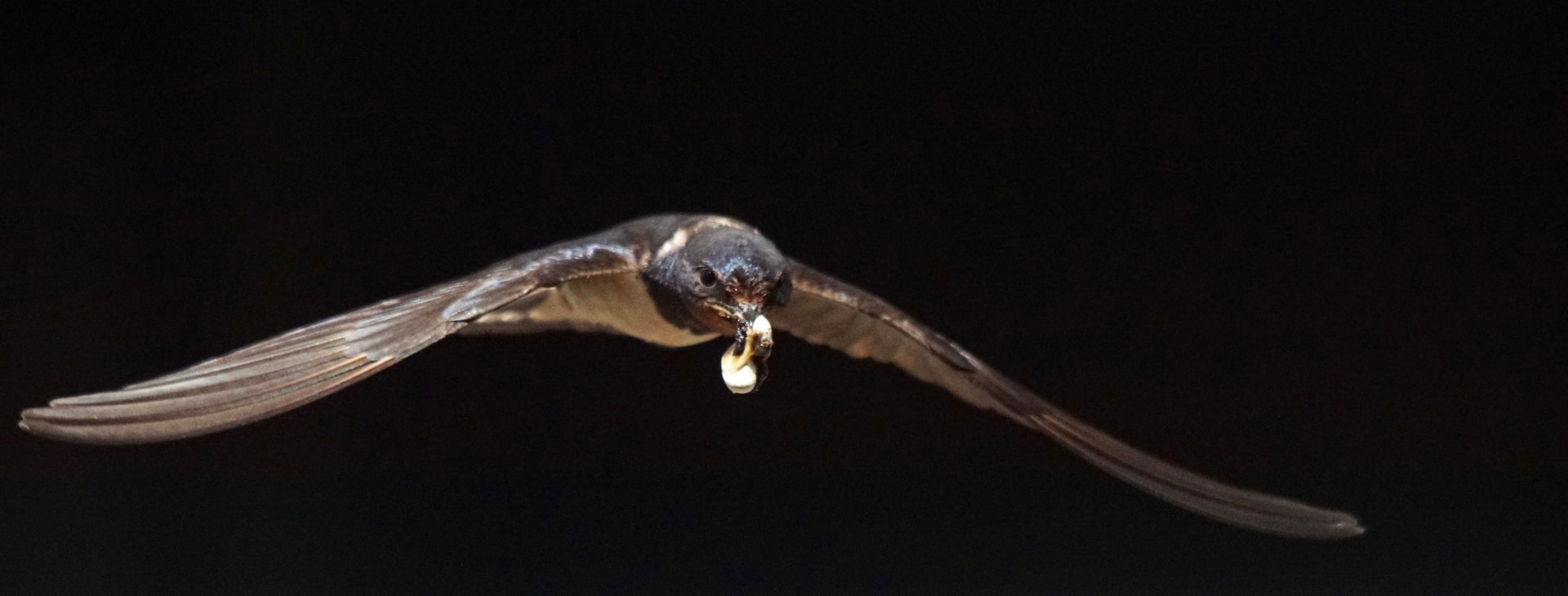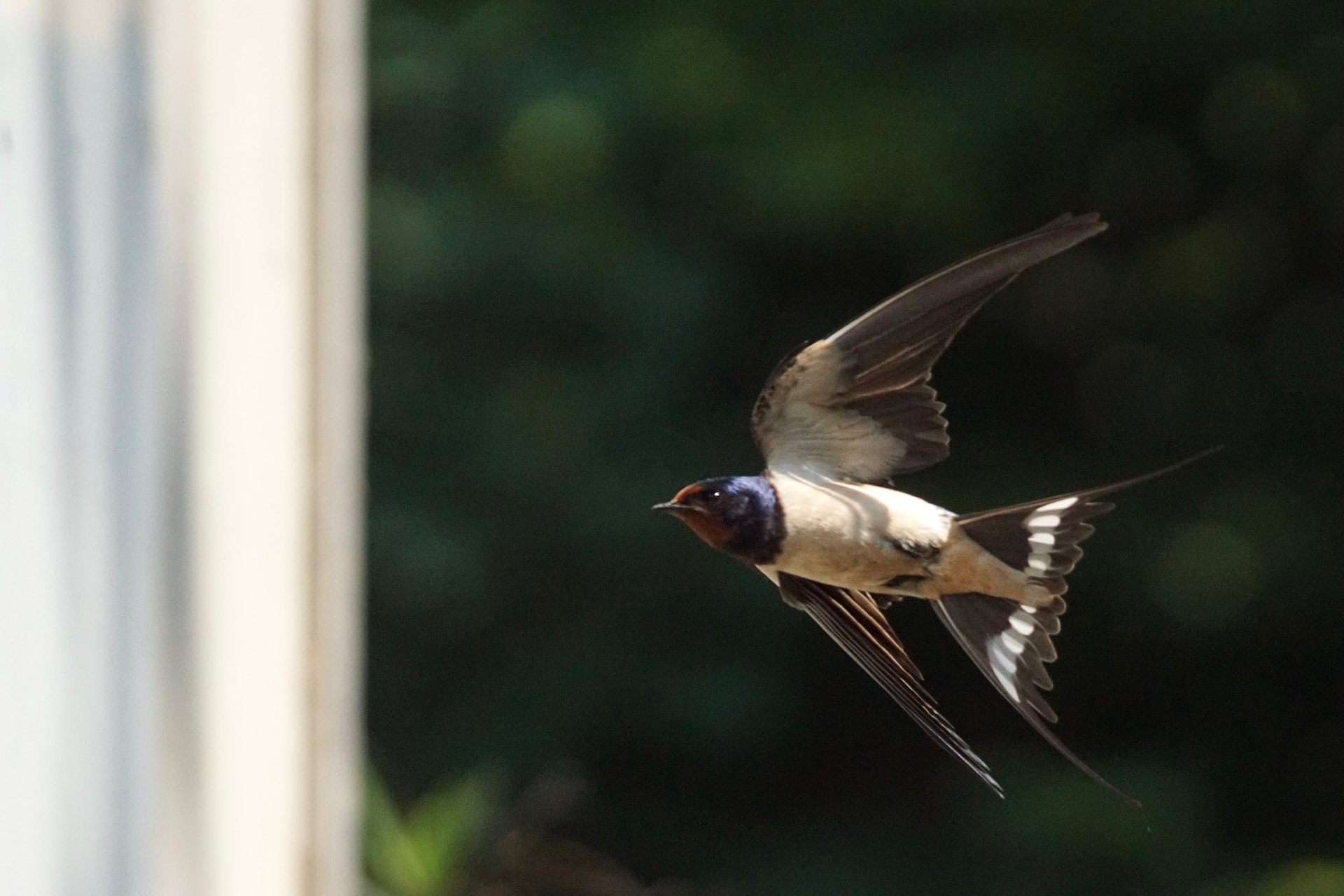Are barn swallows aggressive? Perhaps you have seen a barn swallow swooping and twirling gracefully in the sky or perched atop a tree. But while they may appear timid and seemingly harmless, there is much more to their behavior than meets the eye!
The truth is that while they may not attack other birds or animals. Barn swallows can still become quite defensive when another bird invades their territory or nesting sites. In this post, we’ll explore the answer to the question of whether are barn swallows aggressive and what triggers these defensive behaviors.
Overview of the Barn Swallow

Before we dive into the details of their behavior, let’s first look at the general characteristics and behavior of barn swallows.
👉Identifying Characteristics
The barn swallow is a small bird measuring 15-17 cm in length with a 25-30 cm wingspan. These swallow species have iridescent blue-black feathers on the head, back, and upper chest, while their underparts are white or pale greyish brown. As mentioned, they have long, pointed wings and a deeply forked tail, making them very aerodynamic and able to fly at high speeds. Their bill is short and mostly black but may be reddish at times.
👉Personal Traits
These swallow species are highly social birds that form large flocks during migration season. They are also known for their acrobatic aerial displays, which include steep dives, quick turns, and sudden direction changes in mid-flight – all of which help them catch flying insects! Barn swallows are also monogamous birds, meaning they often mate with one partner for life. During nesting season, they build cup-shaped nests out of mud and grass in sheltered locations such as barns, sheds, or sheltered rock crevices.
👉Distribution
Barn swallows are found on every continent except Antarctica! They breed throughout Europe, Asia, and North America during the summer, while their wintering grounds cover much of Central and South America, Africa, and Asia. During their annual migrations, they travel thousands of miles between these two areas – an impressive feat!
Are Barn Swallows Aggressive?

Now that we have an overview of the barn swallow’s characteristics, let’s dive into the main question: are they aggressive? The answer is yes, but only in certain situations.
🦅Territoriality
One of the primary reasons why barn swallows act aggressively is because they are trying to protect their territory. A single barn swallow pair will defend an area of up to 1/3 acre in size and attack any other birds trying to enter their space. This territorial behavior has been documented in many species of birds, but it seems particularly pronounced in barn swallows.
🦅Rivalry Among Same Species
Barn swallows will become aggressive if they encounter another pair of barn swallows in their nesting territory. They will do whatever it takes to protect their home and mate from intruders, whether chasing away the other birds or attacking them. This is especially true when the intruder is a competitor for mating rights—the male barn swallows will try to drive away any other males who come too close to his female partner.
🦅Nest Protection
If you come across a nest with baby swallows, watch out! The adult barn swallow will become incredibly protective and launch into an aggressive defense of their young if they feel threatened. The male bird will swoop down at any perceived danger while screeching loudly as a warning sign. If this doesn’t work, he may even peck and scratch at the intruder to protect his offspring.
This behavior is seen throughout the animal kingdom whenever animals feel like their young are being threatened. So don’t be surprised if you see barn swallows defending their nests!
🦅Competition for Food Sources
Food sources are often limited during certain times of the year. Barn swallows know this, so they can get particularly aggressive when competing for food sources like insects or berries. They won’t hesitate to chase away any other bird that tries to take advantage of their hard-earned meal! This behavior can also extend to humans; if a human comes too close to a food source (such as a bird feeder), the barn swallow may swoop down and try to scare them off to protect its food supply.
These are some of the primary reasons why barn swallows can be aggressive. While they may not be ferocious predators, they can still defend their territory and young if necessary!
Signs of Aggression in Barn Swallows

If you’re ever in close proximity to a barn swallow, there are some key signs to look out for that indicate aggression. These include:
❗Chirping
When barn swallows feel threatened by another animal or person, they often start chirping loudly to scare away the intruder. The chirp is a warning sign that the bird feels vulnerable and could become aggressive if provoked further.
❗Flapping Wings
If the chirping does not work and the intruder does not back away from the nest area, barn swallows may start flapping their wings as a warning sign that they feel threatened and could become aggressive if provoked further. It’s important to remember that this is usually just a warning — unless you get too close to the nest area, the barn swallow will not likely attack you directly.
❗Dive Bomb
If all else fails and an intruder still doesn’t back away from their nest area, then barn swallows may resort to a dive bombs as a last-ditch attempt at warding off any potential threat. This involves them swooping down towards an intruder while making loud noises with their wings as they go to scare them away.
❗Opening Their Beak
When adult barn swallows open their beak wide while facing you directly, this is usually a sign of aggression (though they can use it for courtship purposes). If you see this happen near a nesting area, it’s best to back away slowly so as not to provoke the bird further.
❗Chasing You
In extreme cases where all other warnings have been ignored or dismissed by an intruder, barn swallows may even chase after people who get too close to their nesting area to ward them off completely! This is rare but can happen, so it’s important to watch for any signs of aggression from these birds if you’re ever near one of their nests.
Barn swallows are incredibly protective of their young and will do whatever it takes to defend them if they feel threatened. While most birds won’t resort to aggressive behavior unless provoked, it’s important to remember that barn swallows display several warning signs when feeling vulnerable.
How To Manage Aggressive Barn Swallows
So if you find yourself in proximity to a nesting area and want to avoid any potential confrontation with an aggressive barn swallow, there are some steps you can take.
1: Determine What Is Attracting Them in the First Place
Barn swallows could become aggressive if they feel like their nest or food source is being threatened. Identifying and eliminating what is drawing them in will help reduce their aggression. Look around your home or garden and see if any potential attractants need removing, such as fallen fruit from trees or bird feeders that have been left out too long.
2: Make Sure There Is Enough Space for Them
Barn swallows are territorial birds and need plenty of space to feel safe and secure. If there isn’t enough space for them, they may become more aggressive to protect their territory from other birds or animals that may try to invade it. Increase the available space by trimming any overgrown vegetation near where they roost and ensuring adequate room between structures on your property.
3: Use Deterrents to Scare Them Away
A few different types of deterrents (man-made structures) can be used to scare off aggressive barn swallows, such as visual deterrents (like shiny objects or fake owls) and sound deterrents (such as recordings of predator calls). You can also set up a bird netting around areas where they tend to congregate to keep them away from your property altogether.
4:Avoid Getting Too Close
Getting too close to an aggressive barn swallow can worsen matters, as they will see this as an intrusion into their territory and may attack if provoked further. Keep your distance from nests or roosting sites, especially during the breeding season ( in breeding grounds) when the birds are extra protective of their young ones!
5: Install Bird Spikes
Bird spikes are metal strips with sharp points sticking out at intervals which act as a physical barrier against the birds trying to land on them. They should be installed at least three feet away from any roosting areas so that the birds cannot easily reach these places. This will help keep barn swallows away from your property by providing a barrier that makes it difficult for them to perch on surfaces.
These tips should help you to manage any aggressive barn swallows that come your way.
The Benefits of Having Barn Swallows Nearby

Though barn swallows can be aggressive, they benefit your home and garden. Let’s take a look at five of the ways having barn swallows nearby can be beneficial.
#1 – Natural Pest Control
Barn swallows love to eat insects and other small creatures, which makes them great natural pest control agents! They will gobble up pesky bugs like mosquitoes and flies, making it much less likely that these pests will bother you or your family.
#2 – Improved Air Quality
Because cliff swallows eat so many bugs, they help reduce air pollution by keeping insect populations in check. It means fewer pollutants in the air and better air quality overall!
#3 – Reduced Parasite Load
Barn swallows are also known to help reduce the number of parasites in an area because they eat their larvae before they can hatch into adult parasites. This is especially important for livestock farmers who depend on healthy animals for their livelihoods.
#4 – Increased Biodiversity
Having barn swallows around will increase the biodiversity of your local ecosystem by providing food and shelter for other species of birds, mammals, reptiles, amphibians, and more! It is always beneficial when different species live together harmoniously in an area.
#5 – Beauty & Enjoyment
Finally, having barn swallows around adds beauty to any landscape! Watching them swoop around gracefully while chirping happily can be enjoyable and calming after a long day.
Frequently Asked Questions
Is Barn Swallows Good to Have Around?
Barn swallows are beneficial creatures to have around, especially if you live on a farm or near farmland. They eat insects, including mosquitoes and other pests, which helps keep bugs away from your property. In addition, their nesting habits provide insulation for buildings and soundproofing for houses. You may even find that their twittering brings joy and comfort!
What Scares Swallows?
Swallows are generally quite fearless birds, but loud noises such as fireworks or thunder can scare them into flight. Additionally, cats and other predators pose a danger to baby swallows. So if you have cats or other pets around your house, watching for swooping birds is best!
Are Barn Swallows Intelligent?
Barn swallows are surprisingly intelligent—they can navigate expansive areas using their natural sense of direction, remember food sources, recognize their nests, and even learn behaviors from each other! This intelligence also makes them easy to train if you want to teach them how to do certain tricks. That said, it’s important to remember that training should only be done with positive reinforcement!
What Are Bad Things About Swallows?
The main concern with owning a barn swallow is their tendency to nest building and homes. This means they may leave droppings around your house, which could lead to potential health risks. Additionally, they may become territorial over their nesting sites, which could lead them to attack people who come too close.
What Is the Enemy of a Swallow Bird?
The biggest enemy of swallow birds in humans due to the destruction of habitats caused by urbanization and agricultural practices as well as pesticide use which kills the insects they rely on for food. Other predators include owls, hawks, and cats, who may prey on eggs or baby swallows.
What Is the Lifespan of a Swallow?
Swallows have an impressive life span considering the perils they face during their migration journey each year. While most adult swallows live around 16 years, they can live longer than that if they survive through the yearly migrations. On average, most swallows must make at least four migratory flights back and forth to survive until age 16! These birds face many challenges on their migratory journeys, including hunting birds and changing weather conditions, but they still manage to find a way close enough to home to finish their life at full strength.
Final Words
So are barn swallows aggressive? Although barn swallows are often associated with being aggressive birds, this is not always the case. If a barn swallow feels threatened or uncomfortable, it may exhibit signs of aggression, but in its normal habitat, they tend to be quite calm and relaxed. But if you ever feel like a swallow is being too aggressive, follow the tips outlined in this article to keep the birds and your property safe. In any case, you can be sure that having barn swallows around your house is wonderful!


